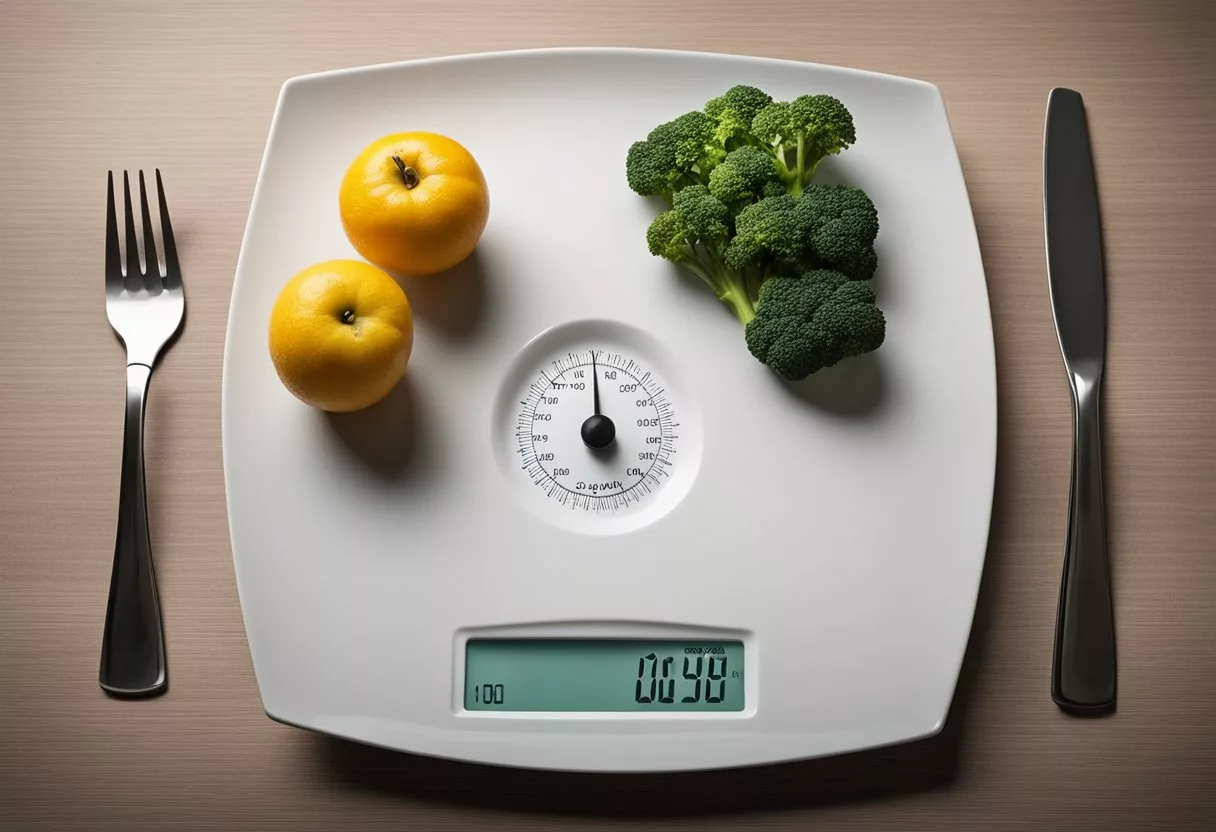Weight loss is often celebrated as a positive step towards better health, but losing weight too rapidly can come with a host of unintended side effects.
While the immediate gratification of quick results can be enticing, the potential consequences on physical and psychological health merit consideration.
Rapid weight loss can trigger metabolic changes, nutritional deficiencies, and emotional distress.
Without a balance between calorie intake and energy expenditure, the body can slip into a state where it doesn’t receive the essential nutrients it needs to function optimally.

Transitioning from a state of fast weight loss to long-term maintenance poses its own set of challenges.
Many individuals struggle to find a sustainable routine that prevents regaining the weight lost.
Implementing healthy alternatives and seeking guidance and support can be crucial for achieving and upholding weight loss goals.
It’s important for those looking to lose weight to understand the risks of rapid weight loss and aim for safe, gradual progress that supports a healthy lifestyle.
Key Takeaways
- Rapid weight loss can lead to significant health issues and undermine long-term weight management.
- Finding a sustainable balance is key to maintaining weight loss and preventing regain.
- Guidance and support systems are essential for safe and healthy weight loss journeys.
Issues with Rapid Weight Loss

Rapid weight loss often stems from methods that significantly reduce calorie intake or excessively increase physical activity in a short period.
This section provides a detailed look at what constitutes rapid weight loss and the potential health risks it carries.
Defining Rapid Weight Loss
Rapid weight loss is generally defined as shedding more than two pounds per week.
This rate surpasses what many health professionals consider safe and sustainable, which is losing 1 to 2 pounds per week.
Rapid weight reduction can occur through a variety of means such as extreme dieting, engaging in excessive exercise, or subscribing to fad diets or crash diets.
Such approaches might promise quick results but often do not provide adequate nutrients, leading to nutrient deficiencies.
Risks Associated With Rapid Weight Loss
Rapid loss of weight can lead to several health risks, such as:
- Dehydration: A sudden drop in pounds is often due to the loss of water weight rather than fat.
- Muscle Loss: Without proper nutrition and exercise, the body may break down muscle for energy, reducing overall strength and stamina.
- Malnutrition: Restrictive dieting may result in not getting enough essential nutrients, causing long-term health issues.
- Gallstones: They are more likely to develop when someone loses weight too quickly.
- Yo-Yo Dieting: This pattern of losing and regaining weight can be a result of rapid weight loss strategies and can affect one’s metabolic rate and overall health.
- Loose Skin: Loose skin is a common secondary effect of rapid weight loss. When you lose a significant amount of weight quickly, especially if it’s through crash dieting or extreme calorie restriction, your skin may not have enough time to adjust to the changes in your body size.
Incorporating a balanced diet and regular exercise is key to achieving weight loss while minimizing these risks.
Physical Health Impacts

Rapid weight loss can lead to a host of physical health consequences such as metabolic disturbances and nutritional deficiencies. These conditions often manifest through symptoms like fatigue and hair loss, signaling the body’s struggle to adapt to sudden changes.
Metabolic Changes
When individuals reduce their calorie intake drastically, the body may enter a survival mode where metabolism becomes significantly slower.
This is a defense mechanism against perceived starvation, conserving energy wherever possible.
As metabolic rates decrease, it becomes increasingly difficult to lose weight and easier to regain it after returning to normal eating patterns.
- Slower Metabolism: Caloric restriction can trigger the body to reduce the amount of energy it burns, leading to a slowing of the metabolic rate.
- Energy Levels: A slower metabolism caused by rapid weight loss can result in decreased energy levels, making it harder to sustain physical activity.
Nutritional Deficiencies
Severe calorie restriction often means not getting enough important nutrients, including vitamins and minerals necessary for proper body function.
This can lead to:
- Fatigue: As the body the lacks energy from a reduced calorie intake, it can cause a feeling of constant tiredness.
- Constipation: Insufficient intake may lead to reduced gut motility and result in constipation due to a lack of dietary fiber.
- Hair Loss: A deficit in key nutrients like protein or iron is closely associated with hair loss.
Muscle and Bone Considerations
Losing weight too quickly often results in loss of muscle mass and bone density because the body may catabolize lean tissue for energy.
- Muscle Mass: Without adequate protein and physical activity, especially strength training, there can be a significant loss of muscle mass.
- Loss of Bone Density: Chronic nutritional deficiencies can foster the onset of osteoporosis, an issue compounded by insufficient intake of calcium and vitamin D.
- Lean Body Mass: Protecting lean body mass is crucial during weight loss to maintain strength and overall health.
Psychological and Behavioral Effects

Rapid weight loss can lead to significant psychological changes and disrupt established behaviors.
While some individuals may see short-term mood improvements, the swift change in diet and lifestyle can also have negative effects on emotional health and eating patterns.
Emotional Well-being
Rapid weight loss often affects a person’s emotional well-being, leading to stress, mood swings, and irritability.
They may experience a heightened state of anxiety or even signs of depression due to both physiological and psychological stressors.
Crash diets can trigger deprivational thinking, where the individual feels deprived of the joy associated with food.
Adherence to a strict diet plan without proper support can exacerbate these feelings.
Eating Patterns
Changes in eating patterns are common in those who undergo rapid weight loss.
Fad diets may lead to unsustainable eating habits or even overeating once the diet ends, potentially leading to eating disorders.
The desire for fast results might cause individuals to adopt extreme, unbalanced diets that impair their mental health and disturb their quality sleep.
Proper lifestyle adjustments, including a balanced diet and adequate support, are essential to maintain a healthy relationship with food and prevent the development of unhealthy behaviors.
Weight Management After Rapid Loss

After individuals experience rapid weight loss, sustaining that weight loss and preventing weight regain pose significant challenges, often requiring a multifaceted approach that includes lifestyle changes and healthy eating behaviors.
Challenges in Sustaining Weight Loss
Rapid weight loss can lead to losing muscle mass, which in turn can decrease metabolic rate and make it more difficult to maintain weight loss.
Those who lose weight quickly might also face plateaus, where their weight loss stalls, prompting frustration and potentially leading to abandonment of healthy habits.
This can then create a cycle of weight regain, which can pose risks for cardiovascular disease and high blood pressure.
Strategies for Effective Weight Maintenance
To manage and maintain weight effectively after a period of rapid loss, integrating slow and steady lifestyle changes is crucial.
Emphasizing slow weight loss going forward can help avoid the pitfalls of rapid weight reduction.
One should:
- Set realistic goals: Incremental targets make maintaining weight loss more manageable.
- Incorporate regular physical activity: This ensures continued calorie burn and can help preserve muscle mass.
- Focus on healthy eating behaviors: Consuming a balanced diet that is high in nutrients but not too restrictive helps to sustain energy levels and prevent nutrient deficiencies.
- Monitor progress: Keeping track of weight and food intake can help identify when adjustments are needed.
Healthy Alternatives to Fast Weight Loss

Rapid weight loss can often lead to negative health consequences, but there are healthier strategies that promote gradual and sustainable weight loss.
These alternatives focus on long-term lifestyle changes rather than quick fixes.
Adopting Gradual Weight Loss Methods
A healthy rate of weight loss is typically defined as losing 1 to 2 pounds per week. This can be achieved through a combination of moderation in caloric intake and an increase in physical activity.
Gradual weight loss is more sustainable as it allows the body to adjust and is more likely to lead to long-term weight management.
- Fiber Intake: Including a variety of high-fiber foods in one’s diet can improve satiety and help control weight. Good sources of fiber include fruits, vegetables, legumes, and whole grains.
- Protein Intake: Adequate protein is essential for maintaining muscle mass during weight loss. Lean meats, poultry, fish, beans, and tofu are excellent sources of protein.
Incorporating Balanced Diet and Regular Exercise
Balanced Diet: A diet that includes a range of nutrients will fuel weight loss efforts and overall health.
The focus should be on:
- Complex Carbohydrates: Whole grains and starchy vegetables provide energy and nutrients.
- Healthy Fats: Avocado, nuts, and seeds offer essential fatty acids.
- Moderation in Sugars and Saturated Fat: Limiting foods high in sugar and saturated fat can aid in maintaining a healthy diet.
Regular Exercise: An essential component of weight loss is regular exercise, which should include:
- Resistance Training: Builds muscle, increases strength, and improves metabolism.
- Cardiovascular Fitness: Activities like running, swimming, or cycling contribute to heart health and calorie burn.
Guidance and Support for Weight Loss

To embark on a weight loss journey, one should consider professional guidance and leverage social support networks for a sustainable and healthy approach.
Consulting Health Experts
A health care provider should be the first contact for someone considering weight loss to ensure any plan is tailored to individual health needs.
Enlisting experts such as a dietitian or nutritionist is crucial in crafting a diet plan that is both effective and nutritionally sound.
For fitness advice, many find that working with a certified personal trainer helps to create a program that increases physical activity safely and effectively. The Mayo Clinic stresses the importance of professional input for a sustainable weight loss plan that aligns with one’s health status and goals.
Community and Social Support
Weight loss can be more achievable with encouragement from support groups. These groups offer a platform to share experiences, tips, and emotional support.
Family and friends often play a pivotal role in motivating and maintaining accountability throughout one’s weight loss journey.
Furthermore, online communities have flourished, allowing for constant access to advice and motivational success stories from peers.
Such networks can be instrumental in providing the necessary support to navigate the challenges of losing weight in a sustainable way.
Frequently Asked Questions

Rapid weight loss can have significant impacts on physical health, triggering various complications depending on the rate and method of weight reduction.
What are the potential impacts of rapid weight loss on cardiac health?
Rapid weight loss can lead to cardiac complications, including an increased risk of developing heart arrhythmias and changes in blood pressure. Sudden weight changes may also strain the heart muscle.
Are there long-term health risks associated with fast weight reduction?
Engaging in a pattern of fast weight reduction can cause long-term health risks, such as gallstone formation, osteoporosis, and nutrient deficiencies. These risks can lead to chronic health problems if not addressed properly.
How does losing weight too quickly affect the liver?
Losing weight too quickly can lead to fatty liver disease due to the rapid breakdown of fat that accumulates in liver cells, which may damage liver function.
What constitutes a dangerously high speed of weight loss?
Weight loss of more than 1-2 pounds per week is typically considered rapid and could be dangerous. This rate exceeds what most health professionals deem safe and sustainable for long-term health benefits.
Can losing a significant amount of weight in a short period cause illness?
Yes, it can cause illnesses such as electrolyte imbalances, dehydration, and malnutrition, which undermine the immune system’s capacity to fend off infections and other diseases.
Why might sudden and extreme weight loss be harmful to health?
Sudden and extreme weight loss can lead to serious health issues. These include muscle loss, hormonal imbalances, and mental health impacts like anxiety or depression.
Such rapid changes can also affect metabolic rate. This can make it more challenging to maintain a healthy weight long-term.